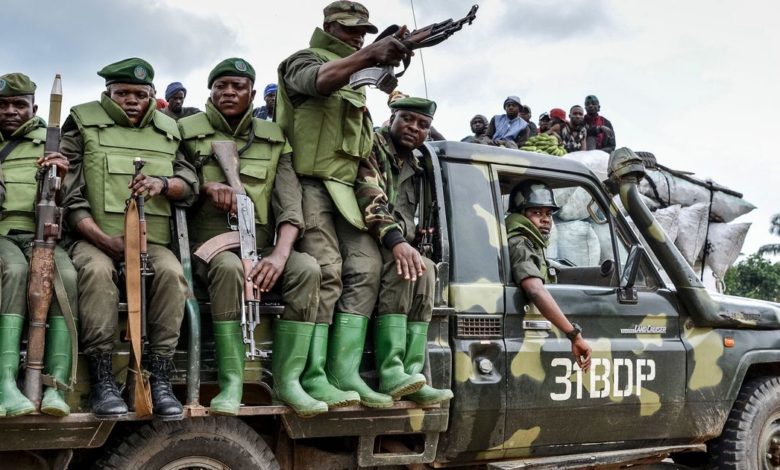MP Attacks DR Congo Government For Starving Soldiers In War Front

Soldiers of the Democratic Republic of Congo national army deployed in Beni, North Kivu, have been without food rations for four months, according to the national parliamentarian for Beni territory, Hon. Paul Muhindo Vahumawa.
He said this amounted to a “programmed demotivation” against these foot soldiers fighting combatants of the Allied Defense Forces (ADF) in the North Kivu region.
Speaking on Friday, October 2, 2020, on the occasion of the sixth anniversary of the Beni massacres, the parliamentarian said it was unacceptable that soldiers fighting rebels on the ground should go for months without food rations.
“This is a demotivation of troops engaged in combat, because it has recently been noticed that our soldiers are forced to cope as animals in the forest or turn to the population.
“Besides, their allowances so loudly vaunted were last paid several months ago and since then they have been cut across the board. How do you expect such demotivated soldiers to win wars?” Vahumawa asked.
He called on the authorities to immediately solve this problem and to deploy more soldiers to Beni in order to bolster the military operations against the rebels of the ADF and their supporters.
Vahumawa said the deployment of forces in Beni was weak and so they could not intervene in several areas when they were attacked by rebel combatants.
“There is a lie that has been spread that there are 21,000 soldiers in Beni (this declaration was made by Congolese President Felix Tshisekedi last week). But the quality of intervention in the area proves that there is an insufficient number of fighters there so much so that when the populations alert the soldiers of the presence or arrival of rebel fighters, they are unable to deploy soldiers because they have to deploy soldiers to various areas at the same time but they don’t have sufficient soldiers. And too, we have been losing many senior army officers and if the number of soldiers in Beni being vaunted were to be true, we would not be where we are now,” Vahumawa said.
Contacted to comment on the allegations, the spokesperson for the Congolese army’s “Operation Sokola” in the area only said that “…the Congolese Army cannot reply to every person playing the popularity game.”
Researchers and other independent sources, however, confirmed that Vahumawa’s allegations were true.
Since 2014, the Beni Region has been subjected to repeated attacks by combatants of the ADF rebel group.
The attacks have resulted in the death of over 4,500 persons and the abandonment of some 195 villages with 1,048 deaths occurring since August 2020, according to Vahumawa.
The parliamentarian had earlier said that on the list of persons killed, the Nandes, who constitute the majority ethnic group in Greater North Kivu, made up over 83 per cent of the victims, followed by the Mbubas with 15 per cent, the Talinges with 0.8 per cent, Pygmies, 0.5 per cent, Biras 0.3 per cent and the Pakombes 0.2 per cent.
Support Our Journalism
There are millions of ordinary people affected by conflict in Africa whose stories are missing in the mainstream media. HumAngle is determined to tell those challenging and under-reported stories, hoping that the people impacted by these conflicts will find the safety and security they deserve.
To ensure that we continue to provide public service coverage, we have a small favour to ask you. We want you to be part of our journalistic endeavour by contributing a token to us.
Your donation will further promote a robust, free, and independent media.
Donate Here




